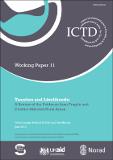Taxation and Livelihoods: A Review of the Evidence from Fragile and Conflict-Affected Rural Areas

Download
Date
2013-06-01Author
Lough, Oliver
Mallet, Richard
Harvey, Paul
Metadata
Show full item recordImpact
Abstract
Despite growing interest in the connections between taxation, development and governance,
surprisingly little attention has been paid to the relationship between taxation and people’s
livelihoods, particularly in places affected by war and violent conflict. Yet, it is in these
landscapes that people encounter particularly fierce challenges to livelihood recovery, often
finding themselves operating in a political economy environment that is at once complex and
shifting, as well as brutal and exploitative. And it is also in these contexts that questions
around public goods provision and state-society relations carry most weight – places affected
badly by conflict tend to have urgent service-related needs, and violent conflicts can erode
trust in governance actors.
Through a selective review of key literature, we argue in this paper that if we are truly
interested in the relationships between taxation and livelihoods, then an exclusive focus on
formal taxation is inadequate. Subsequently, we suggest widening our analytical lens to
include what might be referred to as ‘informal tax’ – that is, payments and costs (for example,
in relation to labour time) which are incurred outside formal statutory arrangements, the
benefits of which may be accrued by a variety of state, non-state and community actors or
institutions. In reality, the lines between formal and informal taxation are likely to be blurred.
Nevertheless, a broad analytical focus on taxation, which captures both its formal and
informal dimensions, may be defined as: all payments – whether cash or in kind, including
labour time – that are made as a result of the exercise of political power, social sanction or
armed force (as opposed to market exchange). Further research is needed to explore these
issues, and this working paper can be considered the first step of an ongoing joint research
project by the International Centre for Tax and Development (ICTD) and Secure Livelihoods
Research Consortium (SLRC) to address this need.
We hope that this work will have implications for how national and international actors think
about both support to livelihoods and processes of state-building in fragile and conflictaffected
situations. Projects aimed at supporting livelihoods are usually focused on trying to
increase people’s income or productive capacities: aid agencies distribute seeds, provide
loans to small businesses and try to stimulate value chains. The expenditure side of the
equation is largely ignored in attempts to support livelihoods – what people have to spend in
order to keep their children in school, get treatment when they are sick, buy and sell produce,
travel to and from towns, and establish and maintain businesses. A focus on taxation may
therefore open up opportunities for new thinking about how to support livelihoods that takes
both expenditure and income into account.
A better understanding of how taxation works at the local level may also contribute to
debates around governance and state-building in fragile and conflict-affected situations.
These have often been framed around the idea that if the state can be supported to do more
for its citizens – for example, by delivering basic services and ensuring security – then
legitimacy gains will follow. However, what tends to be neglected in such debates is the
question of how state actors could become less predatory and extractive. Indeed, the effects
of predatory state behaviour may be just as, if not more, significant in shaping state-society
relations than the effects of supportive behaviour and actions. Similarly, the inability or
unwillingness of states to regulate extractive behaviour by other actors may be perceived
and understood as a visible failure of authority. Thus, a focus on the realities of how people
4
are taxed at the local level – and an examination of whether extractive state activities could
be better linked to the provision of services – may generate important insights into difficult
processes of state-building in conflict-affected situations.
Finally, it is hoped that future research into the issues outlined in this paper might help to
pinpoint opportunities for positive change in local-level tax policies in fragile and conflictaffected
situations. Identifying possible entry points for reform – for example, through applied
political economy analysis – would help researchers and policymakers understand in which
areas or sectors reforms would be most valuable, what the particulars of their design might
look like, and what the political viability of different kinds of reform would be in practice.
